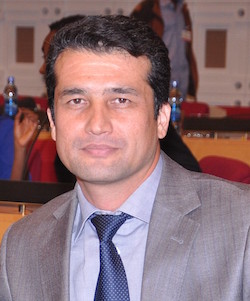 Hayrullo Malikov
Hayrullo Malikov
Social Policy Specialist
UNICEF Gambia Office
Transition Economy Program (’01)
Please tell us about your career path so far. What is your area of specialization and how did you come to work in this area?
In 1997, after graduating from a Turkish University I decided to join the government and contribute to the development of Uzbekistan, then a newly independent country. My professional career started with an economist position in the Foreign Currency Department of the Ministry of Finance of Uzbekistan. In this position, I was dealing with external debt management issues, which was quite challenging given the high demand for foreign investment at the early years of independence.
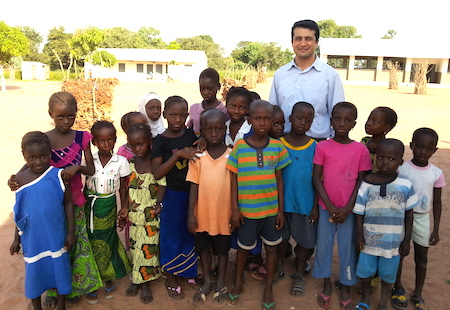
Hayrullo with school kids at a lower secondary school in Upper River Region in the Gambia, November 2014
In late 2001, after receiving my master’s degree from GRIPS, I rejoined the Ministry of Finance of Uzbekistan as a Division Chief at the Department of Appraisal of Investment Projects Financed by International Financial Institutions. In that capacity, I was responsible for providing financial conclusions on the strategic investment projects focused on enhancing the social and infrastructure projects such as rehabilitation of health systems, water supply improvement, construction of railway lines and reconstruction of power generating factories in the country.
In late 2008, I received my master’s degree in Public Policy and Management from the Muskie School of Public Service in the USA. Then, I decided to pursue my professional career in the UN system.
In 2010, I joined UNICEF Uzbekistan office as a Social Policy Officer and in October 2014 I moved to the UNICEF Gambia Office where I have been working since as Social Policy Specialist.
You are currently Social Policy Specialist at UNICEF Gambia. What are your main responsibilities and duties?
Having gained experience at UNICEF Uzbekistan I continued to work in the same field after moving to Gambia. My responsibilities can be grouped into three major areas:
Support knowledge management and evidence generation. This focuses on conducting various studies and analyses of child poverty, socio-economic topics including social protection and public finance for children issues.
Advocate and promote system level changes. This is about supporting national partners in enhancing social protection systems and social budgeting by integrating equity elements and advocating for expansion of fiscal space for children. We also promote dialogue and establish partnerships between international and local stakeholders on the provision of an effective protective environment for the most vulnerable children. This includes the progressive compliance of national policy and planning documents and legislation with the Convention on the Rights of the Child.
Support capacity building. This deals with strengthening institutional and functional capacities of key national partners on the social protection and public finance issues for better implementing and protecting the children’s rights.
What are some of the biggest challenges you face in your work?
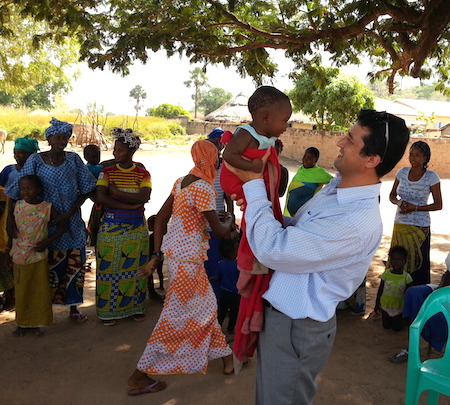
Hayrullo holding a small boy during a visit to a UNICEF project community in Upper River Region in November 2014
Given our interventions at national and local government levels, the capacity and leadership of the government is very important. Sometimes lack of political will, limited ownership and weak capacities will create big obstacles for pushing forward the children’s agenda. Moreover, transparency and accountability are very important factors in promoting system-level changes. If the governance system is not transparent and accountable enough this will also severely impact the welfare of children. What have been the most interesting or rewarding aspects of your career thus far?
Children are powerless segments of each society and they require special care and attention. Poverty is a serious enemy of children. While working in UNICEF I’ve become to understand different dimensions of children’s life and their problems. I really enjoy when I can make a difference for children and see their smiles. Globally, UNICEF works in many countries and deals with a wide range of issues. Helping children to realize and enjoy their rights is very rewarding. For example, in Syria so many children were forced to leave their homes and schools in search for better living conditions. In such critical situations, UNICEF intervenes and provides all necessary support to minimize harm and risks for children. Therefore, I am proud of being part of such prestigious organization.
What do you see as the main challenges and opportunities for Gambia over the course of the next five to ten years?
For the next five and ten years the country will be facing two major challenges: unemployment of youth and rapid urbanization. The economy is heavily reliant on the agriculture and tourism sectors, which cannot accommodate the growing demand for decent jobs by youth. The country will need to foster more productive sectors of the economy to raise living standards of the population. Given its limited domestic financial resources it will rely on foreign investment and donors’ support in order to implement some large-scale economic programmes.
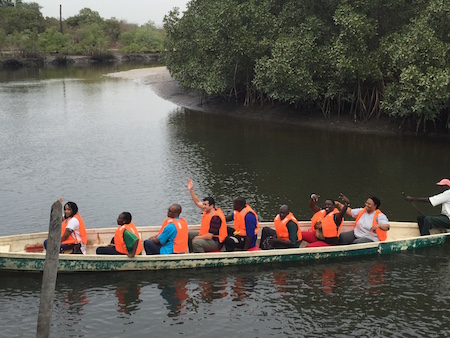
A boat ride with a team of national dancers in Makasuta, The Gambia, February 2016
The high degree of urbanization will put a lot of pressure on the existing infrastructure. Therefore, the government will need to focus on expanding the current infrastructure and social services delivery systems for mitigating negative impacts of urbanization.
A good opportunity is that there is a newly elected president who gives a high priority to governance reform in his policy agenda, which is the very key to transforming the country.
What led you to GRIPS? What was the most important thing you learned while here, and how has your experience at GRIPS prepared you for future endeavours?
The world is changing and we need to catch up with all the progresses and technological developments, otherwise we cannot move forward or accomplish our goals. While working at the Ministry I felt a high demand for upgrading my knowledge and skills to better address the economic development challenges of the country. GRIPS offered a very good opportunity that really helped me advance my knowledge and skills on various subjects such as economics, finance, economic modeling etc. While living in Japan I also became to understand how a market economy and political system work in an environment where democracy and rule of law principles prevail. In addition, I enriched my knowledge about culture, tradition and history of Japan.
GRIPS also changed my way of thinking, which has helped me to build a better professional development pathway. GRIPS has greatly contributed to achieving my professional objectives. I am very grateful to the entire GRIPS team and to those who provided me with this opportunity.
What is your fondest memory of your time spent at GRIPS?
My entire stay in Japan is a fantastic memory. Particularly talking to the students from different countries, conversations with my professors and GRIPS staff are very good memory. I really enjoyed the activities arranged by GRIPS such as visiting different historical sites and production factories.
What do you miss about Uzbekistan and how do you like living in Gambia?
I always miss my country and it is impossible to describe my feelings with one or two words. My parents, relatives, friends, and former colleagues are in Uzbekistan.
It was a big jump coming to Gambia from Uzbekistan. Overall, I like this small country where people are very friendly and live in tolerance with other religions and cultures. It is called “A Smiling Coast” because of its kind and smiling people. It has a touristic season every year starting from November to May and many tourists come from Europe to enjoy sunshine and nice beaches.
How do you maintain the balance between work and the rest of your life? What is your favorite thing to do when you are not working?
UNICEF always promotes a work-life balance approach to maximize our work productivity. I have my family with me here and we spend our time travelling, visiting our friends and enjoying nice beaches. I have some friends and colleagues from the Gambia and other countries.
I am passionate about travelling and try to spend my spare time travelling to different countries with my family.
If you could give one piece of advice to anyone considering studying at GRIPS what would it be?
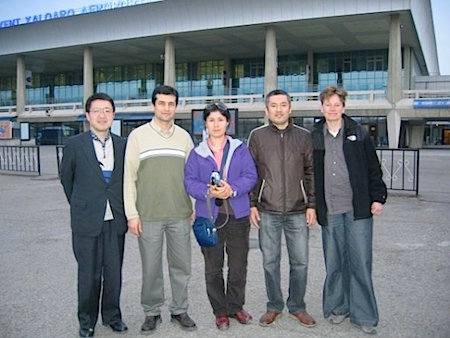
At Tashkent Airport, when Kimura-sensei and Karin-san visited Uzbekistan in March 2009
If an opportunity comes around, I would definitely advise to study at GRIPS and upgrade your knowledge and skills. It is not only about studying but also about broadening your horizon and advancing your way of thinking. I would like to refer to a quote by Persian poet Jalal ad-Din Rumi: “Yesterday I was clever, so I wanted to change the world. Today I am wise, so I am changing myself.”
GRIPS is a perfect place for those people who want to change themselves.
How would you like to maintain involved with GRIPS? What do you expect from GRIPS as an alumnus and do you have any suggestions on how to further utilize the GRIPS alumni network?
We are living in the IT century. The Alumni Office is doing a good job in terms of providing information about the GRIPS alumni. I would like to see more debates and updates at Facebook or LinkedIn about GRIPS’s achievements as well as alumni. I am sure, alumni have something to share with their friends and peers. To hear more interesting stories about their professional life and achievements will be very great.





